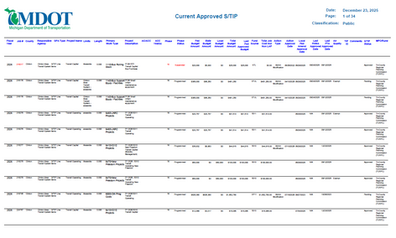HOME > PROGRAMS & SERVICES > TRANSPORTATION > TRANSPORTATION IMPROVEMENT PROGRAM
What is the Transportation Improvement Program?
Our transportation options and quality of infrastructure impact more than just mobility. They influence how we attract talent, create community places, drive economic development, and prioritize connectivity, safety, and accessibility for all who live, work, and play in the Greater Lansing region.
This is why the projects included in our Transportation Improvement Program, or TIP for short, represent more than just an investment into our transportation system – they are an investment in our region’s prosperity and success. They also directly accomplish the goals, objectives, and priorities of the region’s long-range Metropolitan Transportation Plan, which was created with you!
The TIP is the region’s short-range capital improvements program for roads, bicycle and pedestrian pathways, public transit, and other transportation enhancements in Greater Lansing's tri-county region. It includes a list of the federally funded projects planned within Clinton, Eaton, and Ingham counties over the next four years, as well as background information and statutory regulations that guide regional transportation planning across the country. Tri-County adopts a TIP every three years to ensure our communities are eligible to receive state and federal funding for these projects.
The TIP is a living document and is regularly revised to reflect the most current transportation projects planned in the region. Significant revisions to projects, called amendments, may include adding new ones, adjusting timelines for construction or engineering, removing projects, and updating costs and other information. These changes, along with minor administrative modifications, are shared throughout the year at meetings of our technical advisory committee – the Capital Area Regional Transportation Study (CARTS) – and approved by the Board of Commissioners. Previous amendments and project changes may be viewed below.
What else should you know to better understand the TIP? Watch the video below or learn more here!
FY 2026-2029 Transportation Improvement Program
Tri-County’s Board of Commissioners adopted the TIP for fiscal years 2026 through 2029 on May 28, 2025. Our fiscal year 2026-2029 TIP, which plans over $390 million of investment from October 2025 through September 2029, includes a variety of maintenance, reconstruction, new construction, capital purchase, and other projects to improve our roads and bridges, non-motorized networks (including bicycle and pedestrian paths and trails), public transit services and buses, system safety and operations, and various urban and rural transportation infrastructure and mobility needs.
Navigate the document gallery below to view project details, as well as the TIP document and supporting appendices. To learn more about transportation projects planned throughout Greater Lansing's tri-county area, view the current project list (PDF) or explore the layers of our interactive map. Review projects by year or type, or see the full listing by expanding the arrow at the bottom of the interactive project map.
Additional documents in the gallery include background on how projects are scored and prioritized, the schedule for amending projects, policies for revising projects, and other program information.
Annual Listing of Obligated Transportation Projects
View annual reports of past projects that have been obligated (received committed funding) in the below document gallery. The reports include projects, such as public transit, road, nonmotorized, and operational improvements, that are funded with federal dollars. Regionally significant projects supported with state funding are also included.
Past Transportation Improvement Programs
View past Transportation Improvement Programs and past amendments to these programs below.

GET INVOLVED.
MAKE A DIFFERENCE.
Transportation planning affects all of us. It influences the roads that are repaired, the systems that are implemented, and even the goods, services, and businesses that come into the area.
We always welcome feedback on projects planned in the TIP. Check out ways to stay involved below!
What Else Should I Know?
As the Metropolitan Planning Organization (MPO) for the region, Tri-County channels all federal funding for transportation projects into our local communities. The TIP, which plans for these projects, is developed through a cooperative, collaborative process with area road departments, the region's public transit providers, and local, state, and federal government agencies.
The TIP's list of projects is "fiscally constrained," which means that only projects with confirmed funding are listed (it is not a "wish list" of projects). Though funding may come from a variety of sources, the term "obligated" references the federal government's legal commitment to pay their share of a project cost.
The TIP is the short-range implementation arm of the Metropolitan Transportation Plan, and each TIP project must work toward achieving the goals and objectives listed in the Plan and meeting performance measures. The TIP is one of the ways we implement the long-term vision of the Plan, in addition to policy priorities and planning initiatives.
What Types of Projects are Included in the TIP?
Road Improvements
-
Funding is used to improve the condition of the roads and highways.
Transit Capital
-
Funding for capital improvements, including public transportation facilities and bus purchases.
Bridge Work
-
Funding is used to repair and replace state and local bridges.
Safety Improvements
-
Funding is used to contribute to the improved safety of the transportation network by working to reduce fatalities and injuries of both drivers and bicyclists/pedestrians.
Non-Motorized Facilities
-
Funding is used to maintain or improve bicycle and pedestrian connections and infrastructure, including trails.
Administration and Planning
-
Funding is used for collecting data and coordinating studies for improvements for the transportation system, including reducing congestion, improving access and system connectivity, and other mobility enhancements.







































